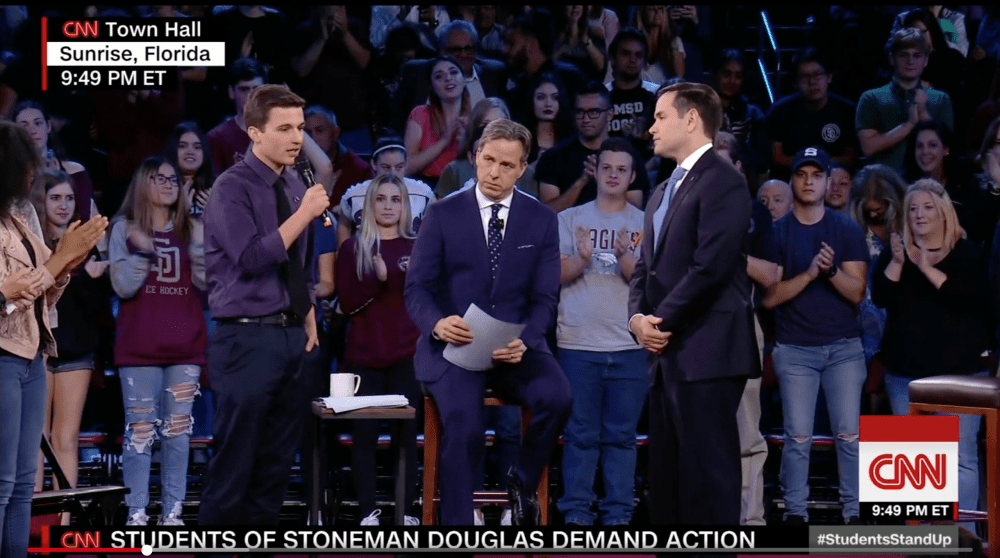Advertisement
Commentary
The Grown-Ups Are Too Polite: Let Teenagers Moderate Political Debates

Remember when Marco Rubio was ridiculed for taking a sip of water while responding to President Obama’s 2013 State of the Union address?
Even if Rubio had chugged the whole (tiny) bottle, the awkwardness of that gaffe would have paled to the utter humiliation that the Florida senator suffered at Wednesday’s CNN town hall event, which was largely attended by survivors of the Parkland school shooting.
The night began with a tense exchange between Rubio and the father of Jaime Guttenberg, a student who was killed during the shooting. After lambasting Rubio’s initial reaction to the shooting as “pathetically weak” — winning massive applause from the audience — Mr. Guttenberg asked Rubio if he would consider a ban on assault weapons. Rubio, of course, dodged the question and offered a diplomatic but vacuous bromide about improving America's background check system and banning bump stocks.
That’s when the kids pounced.
One after another, Rubio’s teenage constituents grilled the senator for his weak record on gun control, as well as his lucrative relationship with the National Rifle Association. (“Can you tell me right now that you will not accept a single donation from the NRA?” emerged as the question of the night.)
With each confrontation, Rubio dodged and danced like one of those inflatable tube men that you see at car dealerships. But the teens refused to settle for the usual de-escalation tactics that politicians like to deploy when they find themselves under scrutiny. And the crowd loved it. Not only did the kids earn cheers for their tough questions, but whenever Rubio alluded to various forms of gun control as political impossibilities — clearly hoping that this would depress everyone and restore calm to the venue — the crowd roared even louder!
It was a riveting case of a powerful politician not losing control of their audience, but finding themselves so out of touch with the audience that any power they might have once projected vanishes.
It was the kind of brutally honest and emotionally charged exchange that millions of us have craved for a long time.
So how do we make this a fixture of American politics and not just a one-off event of tour-de-force TV?
Here’s my idea: Let’s have teenagers moderate political debates.
This might sound ludicrous to those who underestimate the intelligence and rhetorical acumen of young people, but there are two strong reasons for taking this idea seriously.
If the adults won’t take them to task ... let’s give the kids a chance.
First and foremost, teenagers constitute a huge chunk of the American people. They are the ones who will be left to deal with the consequences of whatever today’s senators, congressmen and presidents get up to during their time in public office. And yet, when it comes to interviewing rising politicians in public forums, teenagers are shut out of the conversation. It’s strangely ironic. Many debates are held on college campuses, and yet, almost every time, a senior level broadcast journalist is flown in to ask the questions and moderate the event. Why not assign that task to a pair of talented and tenacious student journalists instead?
That question brings us to the more powerful rationale for appointing youth moderators: disrupting the decorous culture of political debates in America.
As The New Yorker’s Evan Osnos explained in a recent dispatch, the relationship between America’s press corps and its political leaders is often friendlier than it should be, particularly during debates. Questions are asked but the mood remains polite and controlled. This empowers politicians to get away with pivots and dodges when pressed on controversial issues. They know they can get away with it because this is how the game has been played for decades. Even today, its rules are upheld and respected by adults who’ve convinced themselves that civility is more important than authenticity and accountability.
Not only are these rules wrongheaded, but they’re the polar opposite of what today’s young adults believe.
For Millennials and the younger members of Generation Z, authenticity is everything. (More than 400 young people told me this while I was researching my recent book.) This fixation on integrity and “realness” is what inspired so many youth voters to support Bernie Sanders in the 2016 Democratic primary — when talking with young people, Sanders spoke gruffly and openly about what he believed in and had spent most of his career fighting for. That kind of no-nonsense communication is as far from Rubio’s deflection and rhetorical meandering as one could get. No wonder the Parkland students ate him alive.
Of course, the idea of intentionally disrupting the “professional” atmosphere of political debates by tapping teen moderators will offend those who bristle at any whiff of populist rancor. But like it or not, we’re living in a populist chapter of U.S. history when faith in institutions and leaders plummets each day, and with good reason! On issues like gun control, our current leaders have been proven deaf and unresponsive to the opinions of most Americans.
If the adults won’t take them to task for this, let’s give the kids a chance.

